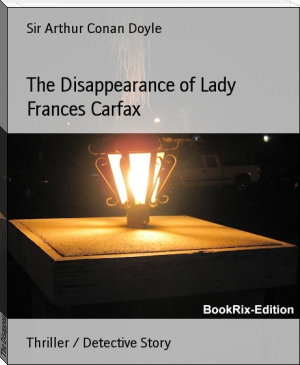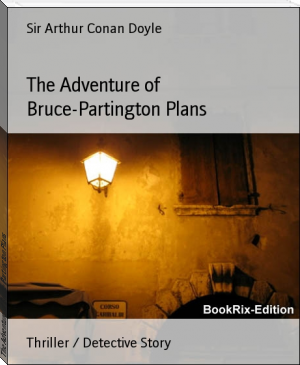His Last Bow - Arthur Conan Doyle (classic books for 12 year olds txt) 📗

- Author: Arthur Conan Doyle
- Performer: -
Book online «His Last Bow - Arthur Conan Doyle (classic books for 12 year olds txt) 📗». Author Arthur Conan Doyle
that you were taking the papers to your brother in London.
Leaving all his private concerns, like the good citizen that he
was, he followed you closely in the fog and kept at your heels
until you reached this very house. There he intervened, and then
it was, Colonel Walter, that to treason you added the more
terrible crime of murder.”
“I did not! I did not! Before God I swear that I did not!”
cried our wretched prisoner.
“Tell us, then, how Cadogan West met his end before you laid him
upon the roof of a railway carriage.”
“I will. I swear to you that I will. I did the rest. I confess
it. It was just as you say. A Stock Exchange debt had to be
paid. I needed the money badly. Oberstein offered me five
thousand. It was to save myself from ruin. But as to murder, I
am as innocent as you.”
“What happened, then?”
“He had his suspicions before, and he followed me as you
describe. I never knew it until I was at the very door. It was
thick fog, and one could not see three yards. I had given two
taps and Oberstein had come to the door. The young man rushed up
and demanded to know what we were about to do with the papers.
Oberstein had a short life-preserver. He always carried it with
him. As West forced his way after us into the house Oberstein
struck him on the head. The blow was a fatal one. He was dead
within five minutes. There he lay in the hall, and we were at
our wit’s end what to do. Then Oberstein had this idea about the
trains which halted under his back window. But first he examined
the papers which I had brought. He said that three of them were
essential, and that he must keep them. ‘You cannot keep them,’
said I. ‘There will be a dreadful row at Woolwich if they are
not returned.’ ‘I must keep them,’ said he, ‘for they are so
technical that it is impossible in the time to make copies.’
‘Then they must all go back together to-night,’ said I. He
thought for a little, and then he cried out that he had it.
‘Three I will keep,’ said he. ‘The others we will stuff into the
pocket of this young man. When he is found the whole business
will assuredly be put to his account.’ I could see no other way
out of it, so we did as he suggested. We waited half an hour at
the window before a train stopped. It was so thick that nothing
could be seen, and we had no difficulty in lowering West’s body
on to the train. That was the end of the matter so far as I was
concerned.”
“And your brother?”
“He said nothing, but he had caught me once with his keys, and I
think that he suspected. I read in his eyes that he suspected.
As you know, he never held up his head again.”
There was silence in the room. It was broken by Mycroft Holmes.
“Can you not make reparation? It would ease your conscience, and
possibly your punishment.”
“What reparation can I make?”
“Where is Oberstein with the papers?”
“I do not know.”
“Did he give you no address?”
“He said that letters to the Hotel du Louvre, Paris, would
eventually reach him.”
“Then reparation is still within your power,” said Sherlock
Holmes.
“I will do anything I can. I owe this fellow no particular good-will. He has been my ruin and my downfall.”
“Here are paper and pen. Sit at this desk and write to my
dictation. Direct the envelope to the address given. That is
right. Now the letter:
“Dear Sir:
“With regard to our transaction, you will no doubt have observed
by now that one essential detail is missing. I have a tracing
which will make it complete. This has involved me in extra
trouble, however, and I must ask you for a further advance of
five hundred pounds. I will not trust it to the post, nor will I
take anything but gold or notes. I would come to you abroad, but
it would excite remark if I left the country at present.
Therefore I shall expect to meet you in the smoking-room of the
Charing Cross Hotel at noon on Saturday. Remember that only
English notes, or gold, will be taken.
“That will do very well. I shall be very much surprised if it
does not fetch our man.”
And it did! It is a matter of history—that secret history of a
nation which is often so much more intimate and interesting than
its public chronicles—that Oberstein, eager to complete the coup
of his lifetime, came to the lure and was safely engulfed for
fifteen years in a British prison. In his trunk were found the
invaluable Bruce-Partington plans, which he had put up for
auction in all the naval centres of Europe.
Colonel Walter died in prison towards the end of the second year
of his sentence. As to Holmes, he returned refreshed to his
monograph upon the Polyphonic Motets of Lassus, which has since
been printed for private circulation, and is said by experts to
be the last word upon the subject. Some weeks afterwards I
learned incidentally that my friend spent a day at Windsor,
whence he returned with a remarkably fine emerald tie-pin. When
I asked him if he had bought it, he answered that it was a
present from a certain gracious lady in whose interests he had
once been fortunate enough to carry out a small commission. He
said no more; but I fancy that I could guess at that lady’s
august name, and I have little doubt that the emerald pin will
forever recall to my friend’s memory the adventure of the Bruce-Partington plans.
The Adventure of the Dying Detective
Mrs. Hudson, the landlady of Sherlock Holmes, was a long-suffering woman. Not only was her first-floor flat invaded at
all hours by throngs of singular and often undesirable characters
but her remarkable lodger showed an eccentricity and irregularity
in his life which must have sorely tried her patience. His
incredible untidiness, his addiction to music at strange hours,
his occasional revolver practice within doors, his weird and
often malodorous scientific experiments, and the atmosphere of
violence and danger which hung around him made him the very worst
tenant in London. On the other hand, his payments were princely.
I have no doubt that the house might have been purchased at the
price which Holmes paid for his rooms during the years that I was
with him.
The landlady stood in the deepest awe of him and never dared to
interfere with him, however outrageous his proceedings might
seem. She was fond of him, too, for he had a remarkable
gentleness and courtesy in his dealings with women. He disliked
and distrusted the sex, but he was always a chivalrous opponent.
Knowing how genuine was her regard for him, I listened earnestly
to her story when she came to my rooms in the second year of my
married life and told me of the sad condition to which my poor
friend was reduced.
“He’s dying, Dr. Watson,” said she. “For three days he has been
sinking, and I doubt if he will last the day. He would not let
me get a doctor. This morning when I saw his bones sticking out
of his face and his great bright eyes looking at me I could stand
no more of it. ‘With your leave or without it, Mr. Holmes, I am
going for a doctor this very hour,’ said I. ‘Let it be Watson,
then,’ said he. I wouldn’t waste an hour in coming to him, sir,
or you may not see him alive.”
I was horrified for I had heard nothing of his illness. I need
not say that I rushed for my coat and my hat. As we drove back I
asked for the details.
“There is little I can tell you, sir. He has been working at a
case down at Rotherhithe, in an alley near the river, and he has
brought this illness back with him. He took to his bed on
Wednesday afternoon and has never moved since. For these three
days neither food nor drink has passed his lips.”
“Good God! Why did you not call in a doctor?”
“He wouldn’t have it, sir. You know how masterful he is. I
didn’t dare to disobey him. But he’s not long for this world, as
you’ll see for yourself the moment that you set eyes on him.”
He was indeed a deplorable spectacle. In the dim light of a
foggy November day the sick room was a gloomy spot, but it was
that gaunt, wasted face staring at me from the bed which sent a
chill to my heart. His eyes had the brightness of fever, there
was a hectic flush upon either cheek, and dark crusts clung to
his lips; the thin hands upon the coverlet twitched incessantly,
his voice was croaking and spasmodic. He lay listlessly as I
entered the room, but the sight of me brought a gleam of
recognition to his eyes.
“Well, Watson, we seem to have fallen upon evil days,” said he in
a feeble voice, but with something of his old carelessness of
manner.
“My dear fellow!” I cried, approaching him.
“Stand back! Stand right back!” said he with the sharp
imperiousness which I had associated only with moments of crisis.
“If you approach me, Watson, I shall order you out of the house.”
“But why?”
“Because it is my desire. Is that not enough?”
Yes, Mrs. Hudson was right. He was more masterful than ever. It
was pitiful, however, to see his exhaustion.
“I only wished to help,” I explained.
“Exactly! You will help best by doing what you are told.”
“Certainly, Holmes.”
He relaxed the austerity of his manner.
“You are not angry?” he asked, gasping for breath.
Poor devil, how could I be angry when I saw him lying in such a
plight before me?
“It’s for your own sake, Watson,” he croaked.
“For MY sake?”
“I know what is the matter with me. It is a coolie disease from
Sumatra—a thing that the Dutch know more about than we, though
they have made little of it up to date. One thing only is
certain. It is infallibly deadly, and it is horribly
contagious.”
He spoke now with a feverish energy, the long hands twitching and
jerking as he motioned me away.
“Contagious by touch, Watson—that’s it, by touch. Keep your
distance and all is well.”
“Good heavens, Holmes! Do you suppose that such a consideration
weighs with me of an instant? It would not affect me in the case
of a stranger. Do you imagine it would prevent me from doing my
duty to so old a friend?”
Again I advanced, but he repulsed me with a look of furious
anger.
“If you will stand there I will talk. If you do not you must
leave the room.”
I have so deep a respect for the extraordinary qualities of
Holmes that I have always deferred to his wishes, even when I
least understood them. But now all my professional instincts
were aroused. Let him be my master elsewhere, I at least was his
in a sick room.
“Holmes,” said I, “you are not yourself. A sick man is but a
child, and so I will treat you. Whether you like it or not, I
will examine your symptoms and





Comments (0)